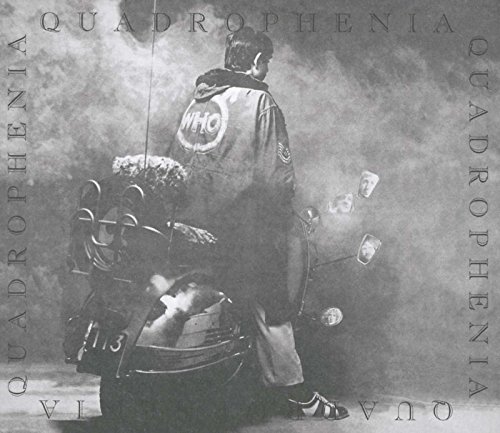245: QUADRAPHENIA | THE WHO
Wiki: Quadrophenia is the sixth studio album by the English rock band the Who, released as a double album on 26 October 1973 by Track Records. It is the group's second rock opera. Set in London and Brighton in 1965, the story follows a young mod named Jimmy and his search for self-worth and importance. Quadrophenia is the only Who album entirely composed by Pete Townshend.
The group started work on the album in 1972, trying to follow up Tommy and Who's Next, both of which had achieved substantial critical and commercial success. Recording was delayed while bassist John Entwistle and singer Roger Daltrey recorded solo albums and drummer Keith Moon worked on films. Because a new studio was not finished in time, the group had to use Ronnie Lane's Mobile Studio. The album makes significant use of Townshend's multi-track synthesizers and sound effects, as well as Entwistle's layered horn parts, in addition to the group's typical playing styles, especially from Moon. Relationships between the group and manager Kit Lambert broke down irretrievably during recording and Lambert had left the band's service by the time the album was released.
Quadrophenia was released to a positive reception in both the UK and the US, but the resulting tour was marred with problems with backing tapes replacing the additional instruments on the album, and the stage piece was retired in early 1974. It was revived in 1996 with a larger ensemble, and a further tour took place in 2012. The album made a positive impact on the mod revival movement of the late 1970s, and the resulting film adaptation, released in 1979, was successful. The album has been reissued on compact disc several times, and seen a number of remixes that corrected some perceived flaws in the original.
1972 was the least active year for the Who since they had formed. The group had achieved great commercial and critical success with the albums Tommy and Who's Next, but were struggling to come up with a suitable follow-up. The group recorded new material with Who's Next collaborator Glyn Johns in May 1972, including "Is It In My Head" and "Love Reign O'er Me" which were eventually released on Quadrophenia, and a mini-opera called "Long Live Rock – Rock Is Dead", but the material was considered too derivative of Who's Next and sessions were abandoned. In an interview for Melody Maker, guitarist and bandleader Pete Townshend said "I've got to get a new act together… People don't really want to sit and listen to all our past". He had become frustrated that the group had been unable to produce a film of Tommy (a film version of Tommy would be released in 1975) or Lifehouse (the abortive project that resulted in Who's Next), and decided to follow Frank Zappa's idea of producing a musical soundtrack that could produce a narrative in the same way as a film. Unlike Tommy, the new work would be grounded in reality and tell a story of youth and adolescence that the audience could relate to.
Townshend became inspired by "Long Live Rock – Rock Is Dead"'s theme and in autumn 1972 began writing material, while the group put out unreleased recordings including "Join Together" and "Relay" to keep themselves in the public eye. In the meantime, bassist John Entwistle released his second solo album, Whistle Rymes, singer Roger Daltrey worked on solo material, and Keith Moon featured as a drummer in the film That'll Be the Day. Townshend had met up with "Irish" Jack Lyons, one of the original Who fans, which gave him the idea of writing a piece that would look back on the group's history and its audience. He created the character of Jimmy from an amalgamation of six early fans of the group, including Lyons, and gave the character a four-way split personality, which led to the album's title (a play on schizophrenia).Unlike other Who albums, Townshend insisted on composing the entire work, though he deliberately made the initial demos sparse and incomplete so the other group members could contribute to the finished arrangement.
Work was interrupted for most of 1972 in order to work on Lou Reizner's orchestral version of Tommy. Daltrey finished his first solo album, which included the hit single "Giving It All Away", fueling rumours of a split in the press. Things were not helped by Daltrey discovering that managers Kit Lambert and Chris Stamp had large sums of money unaccounted for, and suggested they should be fired, which Townshend resisted.

